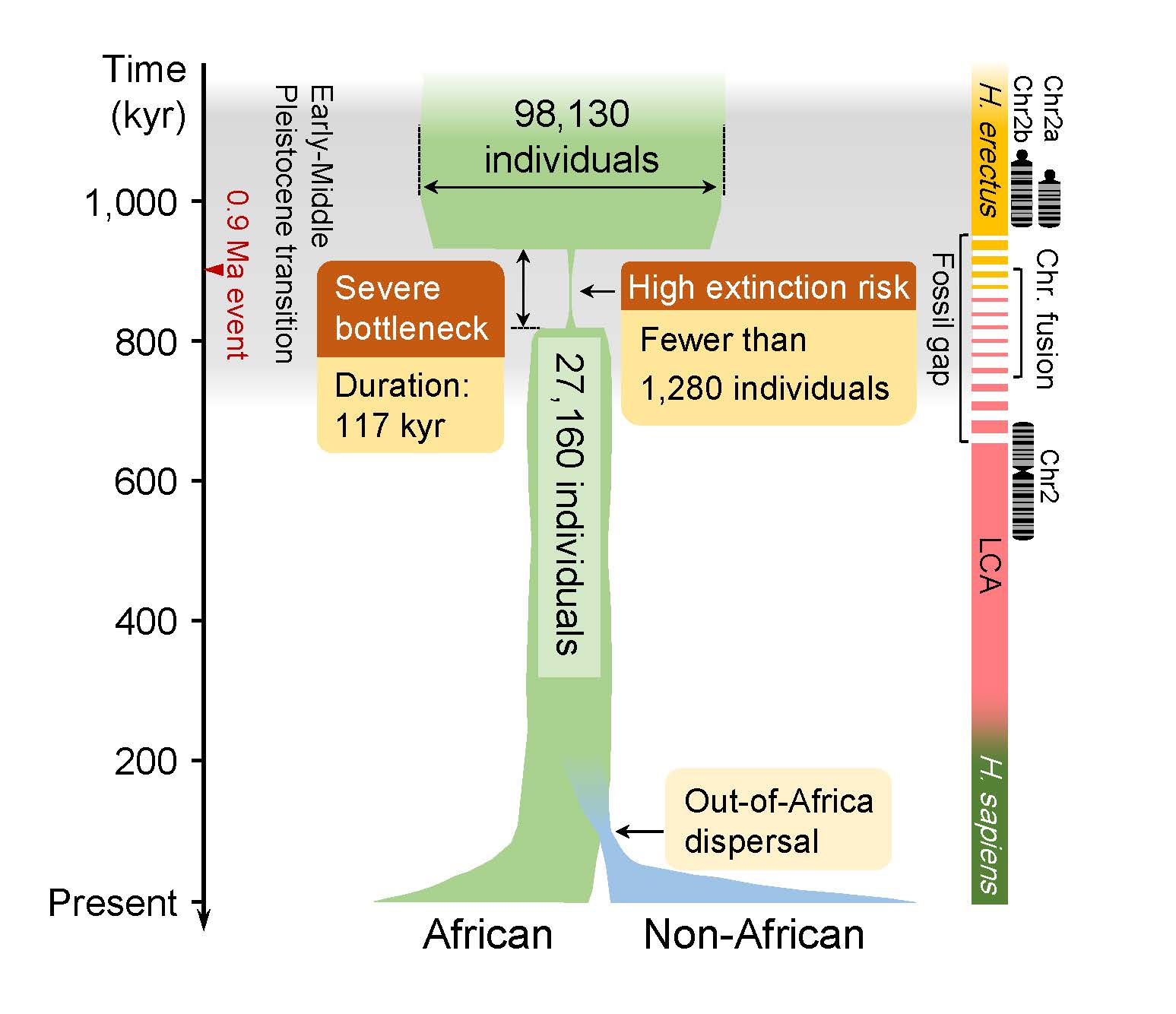
Source: Popular Science
A team of scientists from the United States, Italy, and China may have finally explained a large gap in the African and Eurasian fossil record. According to a model in a study published August 31 in the journal Science, the population of human ancestors crashed between 800,000 and 900,000 years ago. They estimate that there were only 1,280 breeding individuals alive during this transition between the early and middle Pleistocene. About 98.7 percent of the ancestral population was lost at the beginning of this ancestral bottleneck that lasted for roughly 117,000 years, according to the study.
During the Late Pleistocene, modern humans spread outside of the African continents and other human species like Neanderthals began to go extinct. The Australian continent and the Americas also saw humans for the first time and the climate was generally cold. This era is best known for its massive ice sheets and glaciers that shifted around the planet and shaped many of the landforms we see on Earth today..
In this study, the team used a new method called fast infinitesimal time coalescent process (FitCoal), as a way to determine ancient demographic inferences with modern-day human genomic sequences from 3,154 people.
“The fact that FitCoal can detect the ancient severe bottleneck with even a few sequences represents a breakthrough,” study co-author and University of Texas Health Science Center at Houston theoretical population geneticist Yun-Xin FU said in a statement.
FitCoal helped the team calculate what this ancient loss of life and genetic diversity looked like utilizing present-day genome sequences from 10 African and 40 non-African populations.
“The gap in the African and Eurasian fossil records can be explained by this bottleneck in the Early Stone Age chronologically,” study co-author and Sapienza University anthropologist Giorgio Manzi said in a statement. “It coincides with this proposed time period of significant loss of fossil evidence.”

The African hominin fossil gap and the estimated time period of chromosome fusion is shown on the right.
Some of the potential reasons behind this population drop are mostly related to extremes in climate. Temperatures changed, severe droughts persisted, and food sources may have dwindled as animals like mammoths, mastodons, and giant sloths went extinct. According to the study, an estimated 65.85 percent of current genetic diversity may have been lost due to this bottleneck. The loss in genetic diversity prolonged a period of minimal numbers of humans who could successfully breed and was a major threat to the species.
However, this bottleneck also may have contributed to a speciation event, which happens when two or more species are created from a single lineage. During this speciation event, two ancestral chromosomes may have converged to form what is now chromosome 2 in modern humans. Chromosome 2 is the second largest human chromosome, and spans about 243 million building blocks of DNA base pairs. Understanding this split helped the team pinpoint what could be the last common ancestor for the Denisovans, Neanderthals, and Homo sapiens (modern humans).
“The novel finding opens a new field in human evolution because it evokes many questions, such as the places where these individuals lived, how they overcame the catastrophic climate changes, and whether natural selection during the bottleneck has accelerated the evolution of human brain,” co-author and East China Normal University evolutionary and functional genomics expert Yi-Hsuan PAN said in a statement.
In future studies, researchers could continue to find answers to how such a small population persisted in the face of climate adversity. It’s possible that learning to control fire and a climate that began to shift to be more hospitable to human life may have contributed to the rapid human population increase about 813,000 years ago.
“These findings are just the start,” study co-author and Shanghai Institute of Nutrition and Health theoretical population geneticist and computational biologist LI Haipeng said in a statement. “Future goals with this knowledge aim to paint a more complete picture of human evolution during this Early to Middle Pleistocene transition period, which will in turn continue to unravel the mystery that is early human ancestry and evolution.”































